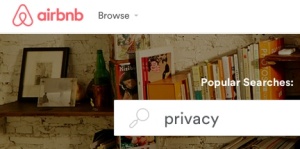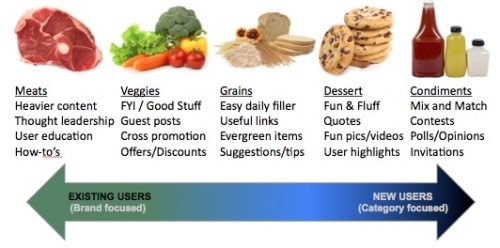Excellent video post about the risks and flaws in paid Facebook promotion, boosted posts etc. As someone who has run paid and organic social media campaigns for my clients, there CAN be real benefits to paid promotion. But like any other sort of advertising, you have to monitor the results carefully and ensure that any campaign is tied to measurable, actionable, purposeful (MAP) goals. If you just get excited about your 10,000 new Facebook Likes you generated at 10 cents a Like, you will likely get very frustrated down the road.
How NOT to keep your customers returning
 AirBnB recently changed their policy to stop exposing email addresses of booked hosts and guests (to each other) under the auspices of protecting your privacy: https://www.airbnb.com/help/article/694. But something tells me the change has more to do with ensuring repeat bookings having to go through AirBnB vs direct between host/guest. It’s always interesting to me when a company born of the free flow of info in the social media age tries to protect a business advantage by limiting info flow. I prefer when companies give me more reasons to stay with them vs limit my ability to use alternatives. A privacy toggle option for email protection makes more sense.
AirBnB recently changed their policy to stop exposing email addresses of booked hosts and guests (to each other) under the auspices of protecting your privacy: https://www.airbnb.com/help/article/694. But something tells me the change has more to do with ensuring repeat bookings having to go through AirBnB vs direct between host/guest. It’s always interesting to me when a company born of the free flow of info in the social media age tries to protect a business advantage by limiting info flow. I prefer when companies give me more reasons to stay with them vs limit my ability to use alternatives. A privacy toggle option for email protection makes more sense.
p.s. Full disclosure. I use AirBnB, both as a host and a guest, and generally like their platform. And despite being my 2nd blog post in a row on their “faults,” I’m really NOT trying to pick on them.
AirBnb Real “Blunder”
Forbes did an interesting piece on the hullabaloo arising after the release of AirBnB’s new logo: What Marketers Can Learn From AirBnB’s Rebrand. I don’t know what process AirBnB went through in doing their rebrand — whether they hired an expensive rebranding firm or did it as a scrappy internal project which would be more fitting their company’s organic culture. Either way, it’s surprising that a company with their resources would have missed the fact that it’s almost identical to another company’s logo. And that they would not do enough user testing to discern that people might see a vagina, boobs, or other symbolism in the logo. Of course, all of this is easy to chastise in hindsight. Having been through dozens of rebranding and renaming efforts for many firms, the one consistent point is that the process is HARD. Every stakeholder has opinions (usually never agreeing), everyone is a designer, everyone wants different objectives, and in the end, most folks are not happy. It can be expensive, time consuming, and extremely distracting. Which begs the question, why did AirBnB choose to do this now? The company is dealing with a myriad of ‘legality of rental’ issues in many cities, has regular ugly press of the “nightmare” guest who wrecked/stole/wouldn’t leave, and still has so much growth potential domestically and abroad. The site, though functional, has a variety of quirks that need resolving. And, like Uber being challenged by Lyft, probably has a would be competitor lurking quietly, ready to pounce. To NONE of the above issues is that answer to take the company through a lengthy and distracting rebranding process. Now, at the end of that process, they have a new issue to deal with … fending off the vagina spotters and other detractors. Meanwhile, the competitor lurking in the dark is probably snickering — while adding a few more customers, improving their site, and figuring a way around the legal issues in cities like New York City. Advantage: Competition.
Posted in Uncategorized
Tagged AirBnb, Automation Anywhere, Logo, Marketing Blunder, Rebranding, Vagina
Here an app, there an app
Interesting research from Nielsen about the fast-growing consumption of apps in the U.S.: http://blog.nielsen.com/nielsenwire/?p=31891. We now spend almost as much time in apps as on the Web. I think we are moving through an epochal change in how we consume media and information.
Just a year ago, I could not imagine a day I didn’t open my laptop to get through the day — work, e-mail, Facebook posts, weekend plans, shopping, etc. I now can, and often will, do much of that on a phone and/or iPad. Dare I say, my snazzy MacBook is becoming an expensive dinosaur before my eyes!

Posted in Uncategorized
Tagged app, appnation, apps vs web, iPad, iPhone, mobile, mobile marketing
The art of data
Can the art of marketing survive in a data driven world? Absolutely. Research suggests that 80% of companies do not use appropriate data to make marketing and business decisions. In today’s age of endless, free tools from Google, AdMob, et al, to allow even a small business to act like they have an army of analysts, why would you not put that information to use. Even an artist, knows the size of his canvas and his budget for paint:)
Here’s a great book on marketing by the numbers … http://www.amazon.com/Data-Driven-Marketing-Metrics-Everyone-Should/dp/0470504544/ref=sr_1_1?s=books&ie=UTF8&qid=1325543750&sr=1-1
Vulnerability — embrace it!
A great TED talk on the importance of accepting and even embracing our vulnerability and weaknesses. So much of marketing and brand strategy involves flexing muscles and overpowering the competition. But maybe the little guys can win by embracing vulnerability and adapting accordingly. After all, success begins at the edge of your comfort zone, right? http://www.youtube.com/watch?v=iCvmsMzlF7o
What does AAA mean to you?
In various entertainment and media segments, the phrase “triple-A release” gets thrown out a fair amount. These are the rare releases that make their publishing companies oodles of cash, generate sequel after sequel, and get the fast-food and CPG companies falling over each other attempting to feature characters on their happy meals and cereal boxes. I developed an acronym related to AAA for launching video games but it occurred to me that it translates to any medium:
For a release to be AAA it should have the following:
Accessibility — Elements that make the masses (not the hard core faithful) feel comfortable during the first few levels, scenes, chapters. A metaphoric wide-open doorway so we don’t feel scared and turn the other way. Watch old episodes of the show ‘Who Wants to be a Millionaire?” Notice something about the first few questions? Brain dead simple. In other words, a wide open door to hook the masses in.
Addictability — Hmm, not sure that’s a word. Remember when we played Space Invaders or Centipede as a kid. A quarter got you in but man did those games suck more than one quarter from me each time. They were addictive. Each level hooked us further and further. Each time someone beat our high score, we had to go back in. The best TV shows, movies, books, and games all have it. They’re like Crack. We can’t give them up till the end.
Amplifiability — Okay, I KNOW that’s not a word. But to be a AAA success you need news of how good your product is to spread like wildfire. An old commercial in the 70s/80s (Wella Balsam shampoo I think) featured a woman’s image being multiplied on screen while she said, “…and they’ll tell two friends, and so on, and so on …” Today this is called viral marketing and marketing execs work themselves into a tizzy trying to leverage it. The good news is, if you have the first two, this part is the easiest. But you do need to plan for it ahead of time, and build it into your product or service, if possible.
Build a product that’s accessible to all, make sure it has addictive elements, and then amplify it through marketing. And you have your AAA release! Pretty simple right? Heh, heh ….
Posted in Uncategorized
Tagged AAA release, Bejeweled, Halo, Harry Potter, Who Wants to Be a Millionaire
What Apple, AT&T, and others can learn from Amazon
I love my Kindle. Why? Is it the clear, easy-on-the-eyes screen? Maybe the fact that current books are about 30% cheaper? Or the ability to quickly look up those hard words from ‘Girl Who Kicked the Hornet’s Nest’ like antediluvian? Well those are all reasons why I like my Kindle. What I love is Amazon’s ‘whispersync’ technology that makes whatever I’m reading (or have read) available anywhere, on any device. Forgot my Kindle on the bus — no problem, I can continue reading on the free Kindle I-phone app. Want to read a few pages at work? Easy … log into Amazon on my work PC and a few seconds later I’m reading during lunch. The text is optimized for whatever device I’m using, and every device even knows what page I’m on! Just because I purchased a Kindle, Amazon does not have the audacity to assume I will always have it with me or that it’s the only way I want to read. Imagine if other devices and services worked the same way. Forgot your I-phone or Droid at home — no problem, borrow a generic work mobile, punch in a few codes and it acts just like your phone for the day (complete with your half finished round of Bejeweled.) Check into a hotel for the night, log into your Comcast service, and presto, you’re watching your home DVR or cable channels you subscribe to. Now I know, syncing your phone or DVR is a bit more challenging than syncing a text based book. But there are some pretty smart people working on this and our devices are getting smarter every day, right? Maybe AT&T et al should spend a little less on giant map ads berating their competition, and more on giving customers what they want. Or just try out a Kindle. They might just learn something.
For more on this topic (for the record, I read this story after I wrote my post) go to: http://www.zdnet.com/blog/government/five-lessons-apple-can-learn-from-amazon/8271
Posted in Uncategorized
Tagged Amazon, Apple, Comcast, connected devices, I-phone, Kindle, whisper-sync
What Facebook location-tagging really means
 1. A severe downturn in the spy and private investigation industries. Why hire a PI when you can simply follow the ‘bread crumb’ trail of someone’s Facebook or Foursquare posts?
1. A severe downturn in the spy and private investigation industries. Why hire a PI when you can simply follow the ‘bread crumb’ trail of someone’s Facebook or Foursquare posts?
2. Longer lines at all Starbucks. Hard enough deciding between a Venti no-foam, non-fat latte and a Grande soy chai latte, but NOW you’ll be concurrently offered a coupon for the same drink at the coffee shop next door PLUS a free pink sprinkle doughnut.
3. Autobiographies and journals made simple. Forget writing in a little black book each evening. Just have Facebook and your phone recreate and b/log your day. After a few years feed it all into a cloud-based auto editor and, POW. Instant autobiography completed and ready to sell millions on Kindle.
4. All new ways to prove your innocence … “But honey, of course I was working late at the office — didn’t you see my Facebook location posts?” Now how do I turn that GPS thing back on?
5. A systematic end to the phrase, “Fancy meeting you here,” except as a sarcastic statement. Seriously, a few years from now, will we ever accidentally run into friends? If not, bummer.


